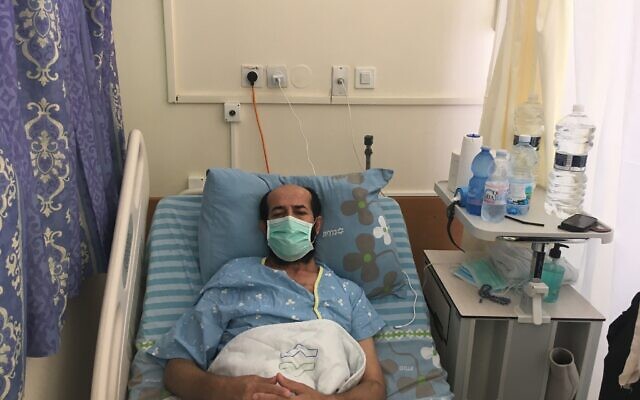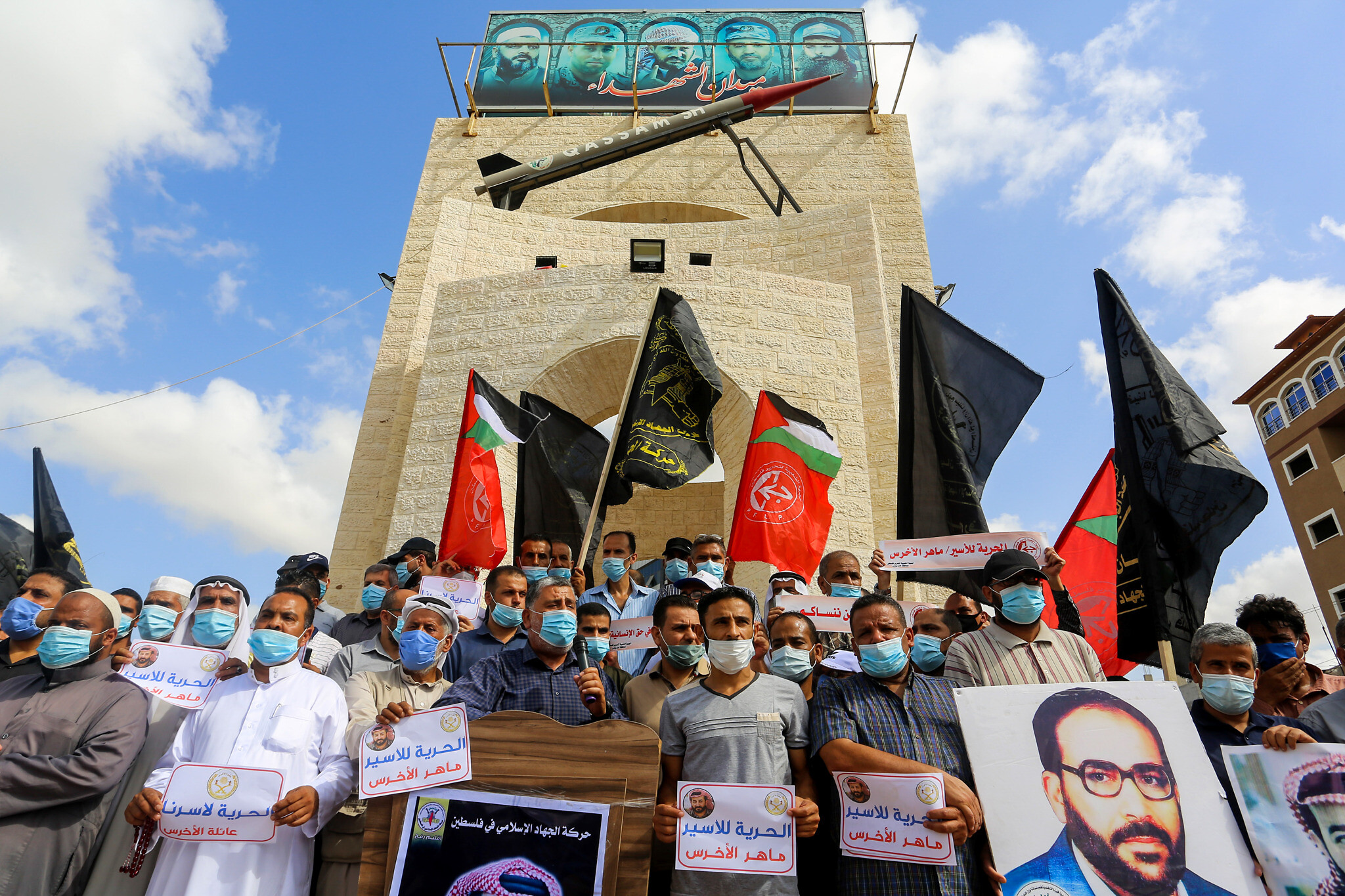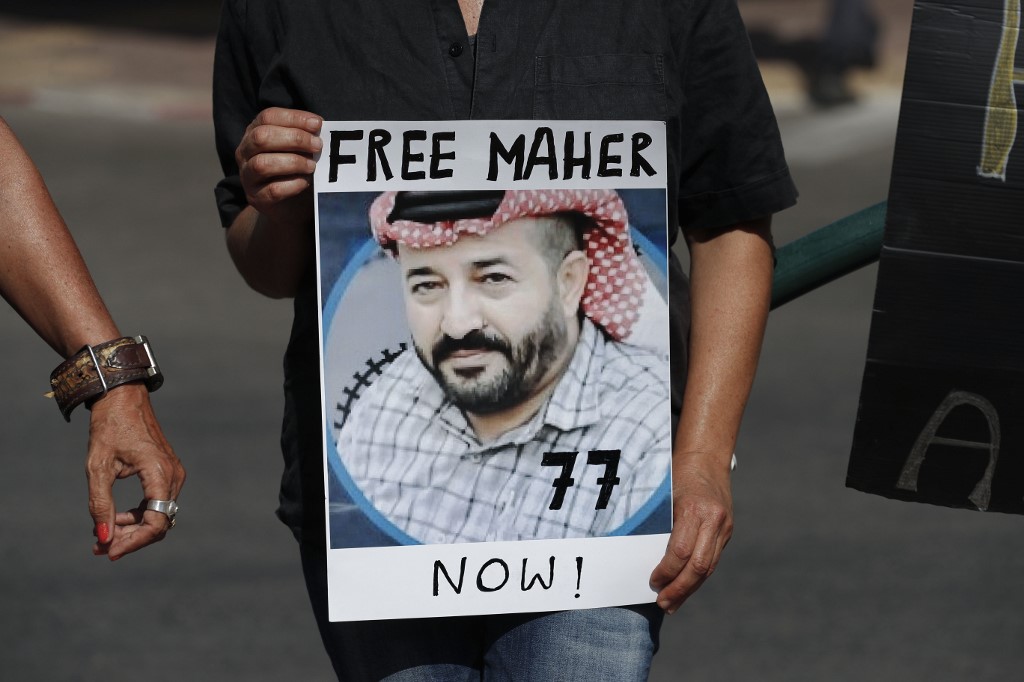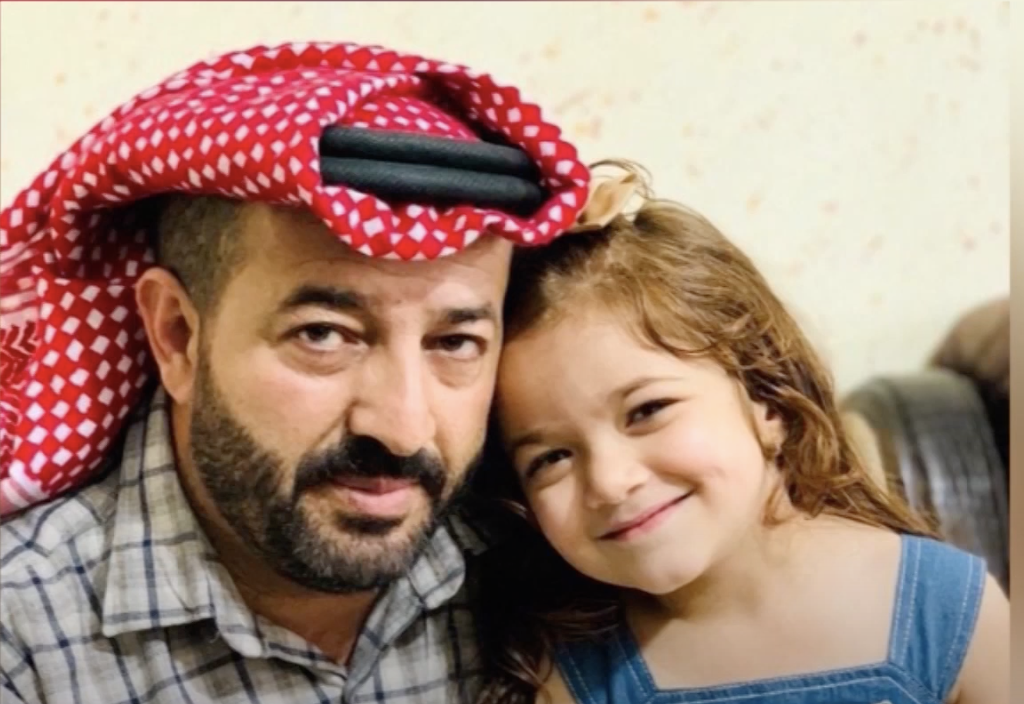Maher al-Akhras was detained in July by Israeli authorities, who say he is a dangerous Islamic Jihad activist, but also plan to free him in November; he denies the accusation

Maher al-Akhras, a 49-year-old security prisoner, while on a hunger strike in Kaplan hospital in Rehovot on October 8, 2020 (Aaron Boxerman/Times of Israel)
As of Wednesday morning, Maher al-Akhras has not eaten for 81 days. He lies in a bed in Kaplan Medical Center in Rehovot. He reports hearing a roaring noise in his ears, and sometimes his eyesight suddenly fades; when he speaks, he groans and closes his eyes in pain from headaches.
Al-Akhras was arrested in late July. For over two and a half months, he has been on a hunger strike in protest of his detention without trial by Israeli authorities, who have accused him of membership in a violent terror group. However, they’ve also indicated he will likely be freed by the end of November, when his administrative detention period ends.
In the meantime, al-Akhras drinks water and refuses all medical treatment, according to his lawyer. Now, according to human rights groups and Kaplan’s medical staff, his health is deteriorating rapidly, and he may be on the verge of death.
“He is in immediate, fatal danger. People who begin hunger strikes and drink nothing but water for days on end begin to die around the 75th day,” said Physicians for Human Rights-Israel staffer Anat Litvin, who specializes in prisoners’ rights.
Al-Akhras has been held in administrative detention, which allows terror suspects to be held indefinitely without trial in renewable increments of up to six months. While detainees can appeal the detention itself to the High Court of Justice or lower district courts, the suspects do not receive full trials or have access to the evidence against them.
He told The Times of Israel that he wanted to see “his children playing with young Jewish and Christian children in freedom” and denied current membership in the terror group. He maintained that he is not involved in any “security activity.” Shin Bet officials had barely questioned him about specific details of his activities, he said.

According to the Shin Bet domestic security service, which is responsible for counter-terrorism in the West Bank, al-Akhras is involved in Islamic Jihad, a Palestinian terror group that avowedly seeks to destroy Israel. The organization has conducted numerous terror attacks against Israelis since its founding in 1981.
“Intelligence was received that [al-Akhras] was a prominent activist in Islamic Jihad, involved in activities that endangered public safety,” the Shin Bet said in a statement.
But Israeli military prosecutors have decided not to renew his administrative detention, which is set to expire on November 26. On Monday morning, the High Court of Justice declined to immediately release al-Akhras before the deadline. Instead, it offered a compromise: Al-Akhras could end his hunger strike now, serve out the rest of his sentence, and his administrative detention would not be renewed afterwards unless new information came to light.
Al-Akhras refused, vowing to continue striking unless he was granted immediate and unconditional release. Asked whether he was not scared of death, al-Akhras said, “It’s in their hands,” referring to the Israeli authorities. “If I agree to go home on their terms, can I really go home? At any point any Shin Bet officer can decide to simply arrest me again.”
Al-Akhras, a 49-year-old resident of Silat al-Daher outside Jenin, has been arrested five times for alleged involvement in Islamic Jihad, according to the Shin Bet. He is the father of six children and owns one of the largest dairies in the West Bank.
In 2005 and 2019, he pled guilty to membership in a banned organization, according to the Haaretz daily, which added that court filings stated that he had attended Islamic Jihad marches, including delivering speeches at some of them, and posted extremist material on Facebook.
Al-Akhras alleged Israeli forces “took me purely so as to humiliate me. I knew the officer who arrested me [from my previous arrests]… and he knew me. They said they arrested me just to punish me.”
His wife Taghreed nodded as she stood at his bedside; she recently received a permit from Israeli authorities to visit al-Akhras during the day, before returning to the West Bank each night.
On September 6, the courts ruled that al-Akhras was too weak to remain in Ofer Prison, where he had been detained. He was subsequently transferred to Kaplan Medical Center, where he has remained ever since, according to his lawyer Ahlam Haddad.
While al-Akhras’s detention has remained on the margins of most Israeli media, it has made headlines in the Palestinian press — which is largely dominated by the two ruling parties, Fatah and Hamas. A few small, scattered demonstrations calling for his release have been held across the West Bank and Gaza.
Al-Akhras’s death could ignite further tensions between Israel and Palestinian factions in both Gaza and the West Bank.
Both Palestinian Authority Prime Minister Mohammad Shtayyeh and former Hamas political chief Khalid Mashaal have demanded that Israel immediately let him go. Numerous members of the mostly Arab Joint List party have visited him; as The Times of Israel left, Joint List MK Usama Saadi entered for an extended conversation.
“If al-Akhras dies, it will be an execution without a trial,” charged MK Ofer Cassif, the sole Jewish parliamentarian in the Joint List.









